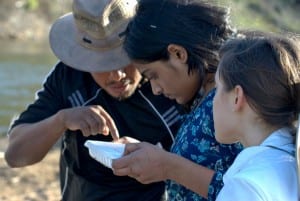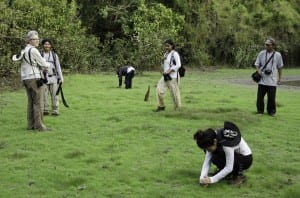 “Exploring the Art & Science of Biodiversity in Guyana” is an interdisciplinary course focused on approaches to the concept of biodiversity in the arts, humanities, and sciences. The six-credit travel course is offered during the Wintersession term at the Rhode Island School of Design (RISD). Dr. Nicole M. Merola, Associate Professor of Literary Arts & Studies, and Dr. Lucy Spelman, a veterinarian, science educator, and Lecturer in History, Philosophy, and Social Sciences, team-teach the course.
“Exploring the Art & Science of Biodiversity in Guyana” is an interdisciplinary course focused on approaches to the concept of biodiversity in the arts, humanities, and sciences. The six-credit travel course is offered during the Wintersession term at the Rhode Island School of Design (RISD). Dr. Nicole M. Merola, Associate Professor of Literary Arts & Studies, and Dr. Lucy Spelman, a veterinarian, science educator, and Lecturer in History, Philosophy, and Social Sciences, team-teach the course.
Drs. Merola and Spelman designed the course to help students engage with biodiversity both conceptually and concretely. The key questions that structure the course include:
- What concepts, theories, and methods inform research and debates about biodiversity, conservation, and human impacts on the natural world?
- How and by whom are biodiversity field studies conducted?
- What kinds of science, stories, and metaphors shape our understanding of socio-ecological networks and how they change over time?
- How do we represent biodiversity to ourselves and to others by means of particular images and narratives, and to what effect?
- How might we bring the arts, humanities, and sciences together in order to think about biodiversity?
- What role does ecotourism play in contributing to how we understand and value biodiversity?
 Two weeks of coursework at RISD introduce students to biological, cultural, economic, environmental, and political histories of Guyana; natural sciences definitions of biodiversity; principles of conservation science; fieldwork methodologies; and environmental humanities approaches to biodiversity and extinction. The students and instructors then spend approximately two weeks in Guyana. Students are briefly introduced to Georgetown, Guyana’s capital, but most of the coursework takes place in the interior of the country, in the sparsely populated North Rupununi region. The course is based at the Karanambu Trust House, a biodiversity research and training stationsupported by its sister organization, the Karanambu Lodge, an award-winning ecotourism destination.
Two weeks of coursework at RISD introduce students to biological, cultural, economic, environmental, and political histories of Guyana; natural sciences definitions of biodiversity; principles of conservation science; fieldwork methodologies; and environmental humanities approaches to biodiversity and extinction. The students and instructors then spend approximately two weeks in Guyana. Students are briefly introduced to Georgetown, Guyana’s capital, but most of the coursework takes place in the interior of the country, in the sparsely populated North Rupununi region. The course is based at the Karanambu Trust House, a biodiversity research and training stationsupported by its sister organization, the Karanambu Lodge, an award-winning ecotourism destination.
Karanambu encompasses 110 square miles of savannah, marshy ponds, riparian forest, and a 30-mile stretch of the Rupununi River. Its wildlife includes 600 species of birds, several hundred species of mammals, reptiles, and amphibians, as many as 700 fish species, and an unknown number of invertebrates. All field activities and classes held at the Karanambu Trust House involve local participants, and RISD students collaborate with local Makushi Amerindians on two research projects. For the first project students participate in ongoing biodiversity monitoring designed to document the flora and fauna of the Karanambu wetlands and savanna. This research extends studies initiated by previous field ecology courses and contributes to ongoing efforts by the Trust to evaluate both the biological value of the area and the extent of human impact on its flora and fauna. The second project asks students to use art, design, and humanities research to explore the personal resonance of the Karanambu environment and to think about how their experience of biodiversity, and its value, might be conveyed to a wider audience.
 Student projects during the Wintersession 2014 iteration of the course included using species richness studies and GPS tracking to produce a map of Karanambu that indicates where eco-tourists are most likely to see specific birds and mammals, employing camera traps and bird and mammal tracks to compare biodiversity in different Karanambu habitats, investigating local folktales and myths and studying the behavior of giant river otters to generate source material for an illustration, and creating a video archive of bird flight patterns and behaviors to inform future animation projects.
Student projects during the Wintersession 2014 iteration of the course included using species richness studies and GPS tracking to produce a map of Karanambu that indicates where eco-tourists are most likely to see specific birds and mammals, employing camera traps and bird and mammal tracks to compare biodiversity in different Karanambu habitats, investigating local folktales and myths and studying the behavior of giant river otters to generate source material for an illustration, and creating a video archive of bird flight patterns and behaviors to inform future animation projects.
Dr. Nicole M. Merola is Associate Professor of Ecocriticism and American Literature in the Literary Arts & Studies Department at the Rhode Island School of Design, where she teaches courses on the Anthropocene, climate change cultures, contemporary ecological fiction, green film, narratives of evolution, and theories of natureculture. In addition to her work as a veterinarian board-certified in zoological medicine, which has included treating giant pandas in China, Asian elephants in Burma, giant river otters in Guyana, and mountain gorillas in Rwanda, Dr. Lucy Spelman is a writer and an educator with a keen interest in exploring new ways to use the arts to communicate and interpret science. A Lecturer in the History, Philosophy, and Social Sciences Department at the Rhode Island School of Design, Dr. Spelman teaches courses on evolutionary biology, the biology of human-animal interactions, and the art of communicating science
